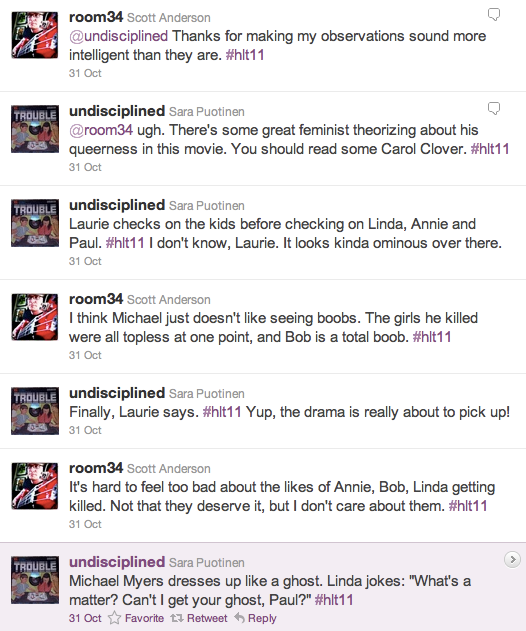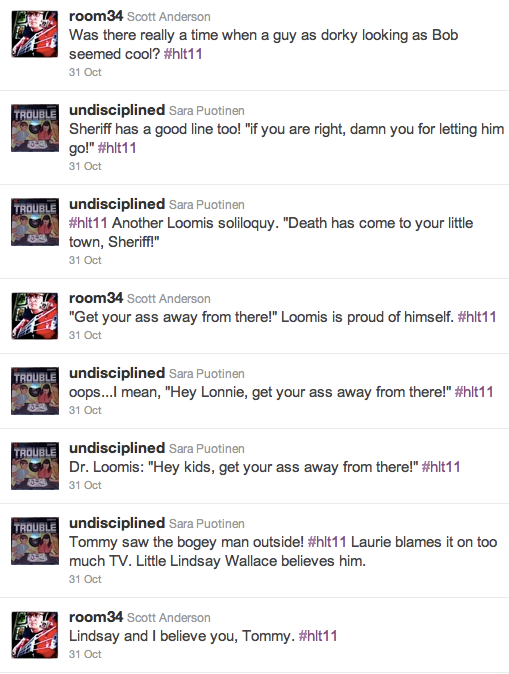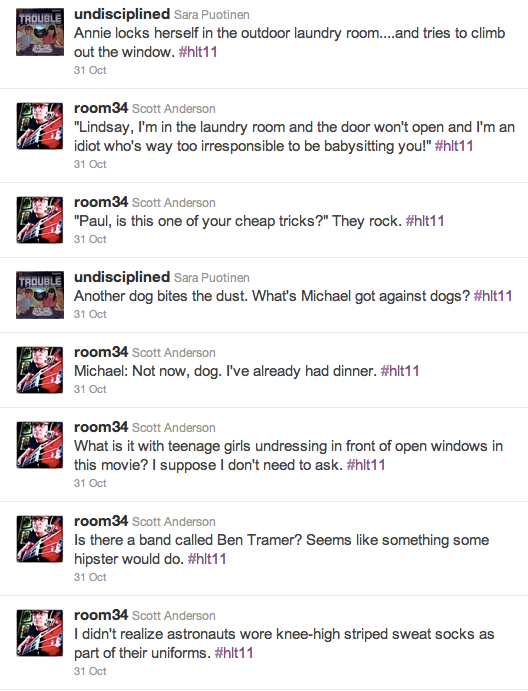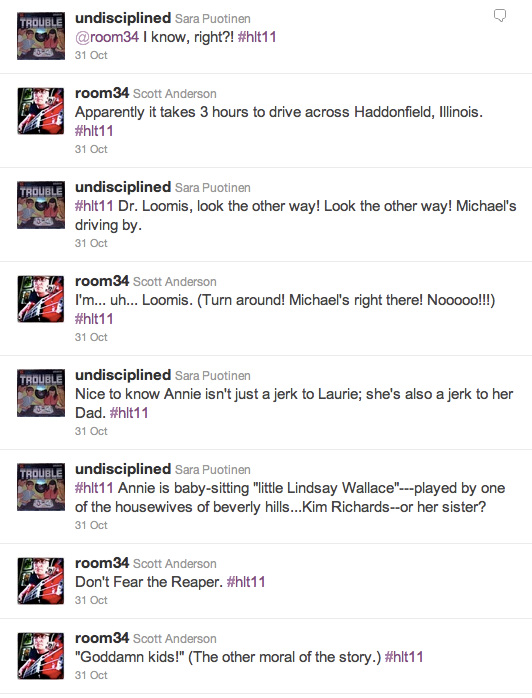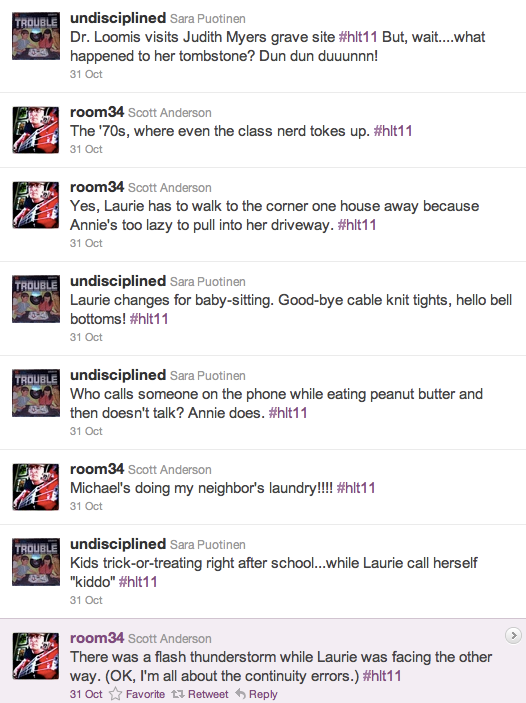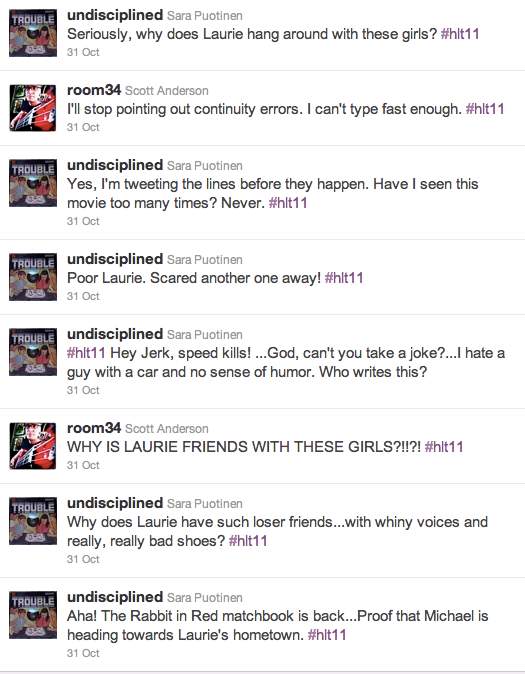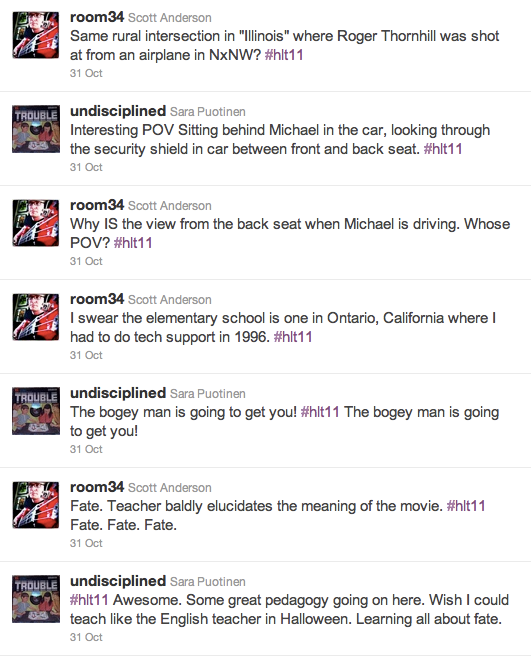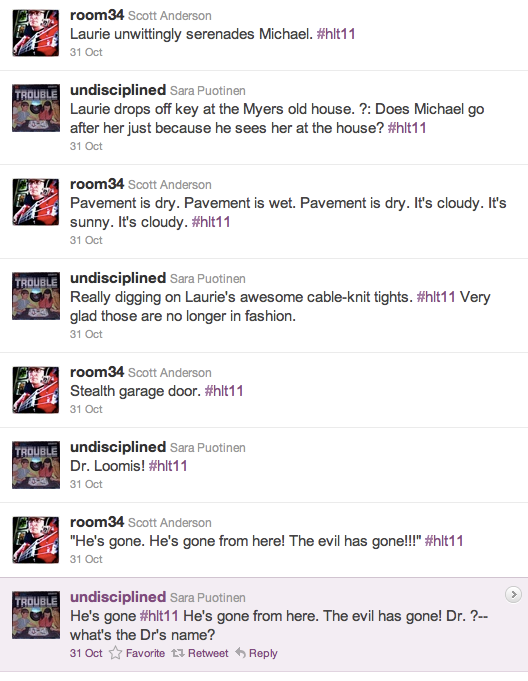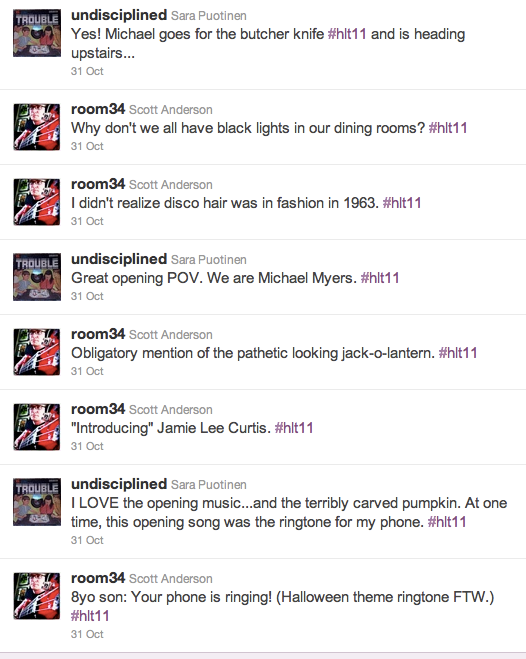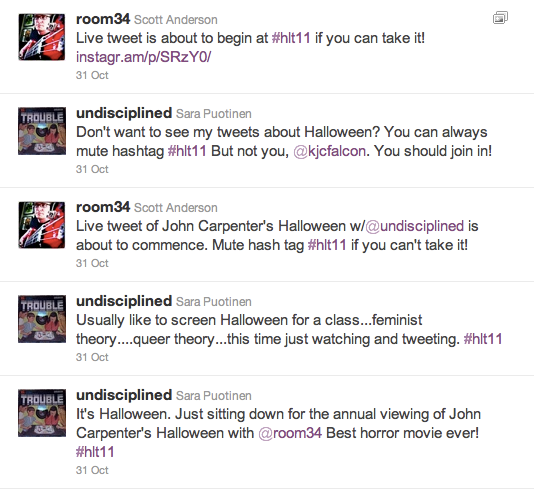I just tried using storify for archiving the live-tweet that I created while reading Jessica Yee’s introduction to Feminism for Real: Deconstructing the Academic Industrial Complex of Feminism. Here it is:
Category: Social Media
Live-tweeting Halloween (the movie) with @room34 (STA)
For the past 6 years, STA and I have watched Halloween on (or around) Halloween night. Sometimes we make it through the whole movie (like this year!) and sometimes one of us (usually me) falls asleep before it ends. This year I thought it would be fun to try live-tweeting our viewing of it. STA came up with the equally brilliant idea to use a hashtag for our tweets, #hlt11 (Halloween Live Tweet 2011). To document our attempt, I did screen shots of all of the tweets. You can see them below. Make sure to read the tweets from top to bottom.
Troublemaking with social media?
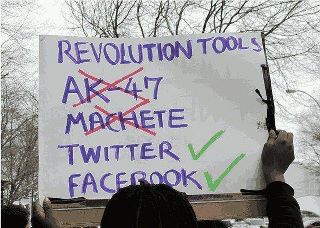 Just saw this photo from the Occupy London facebook page. Very fitting, considering I’m currently trying to finish an article on how twitter might enable us to be more engaged citizens. In my article, tentatively (and very boringly–is that a word?) called “Twitter, Authenticity and Ethical Engagement,” I plan to examine three different twitter projects from (or that started) last year that were used to spread awareness and transform understandings about abortion: Angie Jackson’s live-tweeting of her abortion in February of 2010; the hashtag #ihadanabortion, first used in the fall of 2010; and the twitter handle, @IamDrTiller. One of my key arguments is that these three examples need to be taken seriously and closely examined to explore their potential for encouraging us to be more engaged, caring and ethical citizens. Originally I had planned to focus only on Jackson’s live-tweeting of her abortion (via the RU486 pill), however after doing some more research, I’ve decided to also include the hashtag and twitter handle, both of which were created by Stephanie Herold from abortion gang (we’re talking about this issue and Herold in my feminist debates class this semester). I want to think about these three examples in relation to Joan Tronto and her feminist ethic of care (specifically, her ideas of caring about, giving care and receiving care). It is interesting to think about this idea of caring about and giving/receiving care in relation to the image from occupy london. Revolution seems to be about disruption, destruction and struggle while Tronto’s definition of care is grounded in care, repair and the maintaining of the world (see my discussion here). Is it possible to think about these things together? Well, that’s one thing that I’m trying to do in my own work by (re)imagining troublemaking as a form of care and maybe care as a form of troublemaking?
Just saw this photo from the Occupy London facebook page. Very fitting, considering I’m currently trying to finish an article on how twitter might enable us to be more engaged citizens. In my article, tentatively (and very boringly–is that a word?) called “Twitter, Authenticity and Ethical Engagement,” I plan to examine three different twitter projects from (or that started) last year that were used to spread awareness and transform understandings about abortion: Angie Jackson’s live-tweeting of her abortion in February of 2010; the hashtag #ihadanabortion, first used in the fall of 2010; and the twitter handle, @IamDrTiller. One of my key arguments is that these three examples need to be taken seriously and closely examined to explore their potential for encouraging us to be more engaged, caring and ethical citizens. Originally I had planned to focus only on Jackson’s live-tweeting of her abortion (via the RU486 pill), however after doing some more research, I’ve decided to also include the hashtag and twitter handle, both of which were created by Stephanie Herold from abortion gang (we’re talking about this issue and Herold in my feminist debates class this semester). I want to think about these three examples in relation to Joan Tronto and her feminist ethic of care (specifically, her ideas of caring about, giving care and receiving care). It is interesting to think about this idea of caring about and giving/receiving care in relation to the image from occupy london. Revolution seems to be about disruption, destruction and struggle while Tronto’s definition of care is grounded in care, repair and the maintaining of the world (see my discussion here). Is it possible to think about these things together? Well, that’s one thing that I’m trying to do in my own work by (re)imagining troublemaking as a form of care and maybe care as a form of troublemaking?
On another note, I’m planning to discuss the occupy movement (is it a movement? what else should we call it) in my queering theory class next week. We’re discussing the concept of the abject and reading some Butler (from Gender Trouble and Bodies that Matter), Dorothy Allison (“A Question of Class”) and various online sources about occupy wall street (including this awesome site: History is a Weapon). In that discussion, and in my own critical reflections on the occupy phenomenon and the ethical/political value of twitter, I want to think more about what it might mean to use twitter as a revolution tool? How? And in tandem with what other tools? What are its limits as a tool? Possibilities? How specifically has it challenged/disrupted/made trouble for the system?
Okay, I need to finish a draft of my article soon. I better start writing!
(feminist ethics of) Care of Self (help): some sources
For some time now, I have been interested in thinking through the ethical potential of blogs and blog writing and engaging. For me, this ethical potential is connected to troublestaying and the training of oneself to be curious and pay attention (to care about/for) the world. For this project, I want to bring Foucault (and a care of the self) into conversation with Butler and troublemaking, a feminist ethics of care and many of my own ideas about using blogs to cultivate the virtue of making, being in and staying in trouble. Lately, I have also been interested in bringing this all into conversation with self-help books/blogs/attitudes. This is perhaps partly inspired by Sara Ahmed and her critique of the happiness industry in The Promise of Happiness, but also inspired by my dislike of popular/mass-media self-help books in general and how they seem to discourage critical reflection and curiosity. Here are some preliminary sources on caring for the self that I want to consider when I have more time to write (will that ever happen?):
ONE: Helen O’Grady. Woman’s Relationship with Herself. Gender, Foucault and Therapy. I am particularly interested in O’Grady’s chapters 4 on refusing self-critique, 5 on Foucault and an ethics of care for the self and 6 on whether or not Foucault and therapy are in contradiction with each other. O’Grady uses Foucault’s model of the panopticon and his discussion of self-policing to understand many of the problematic ways in which women (what does she mean by “women” here?) use therapy to shape their relationships to themselves. Then, she looks to Foucault’s later work on the care of the self to point to another model for envisioning and cultivating a relationship to self. Am I heading in the right direction with this source? Not sure, but I am hopeful that it will point to some other useful sources.
TWO: Yashna Maya Padamsee. Communities of Care, Organizations of Liberation I really like this author’s suggestions to shift away from self-care to community care and healing justice. Here’s a great passage:
We need to move the self-care conversation into community care. We need to move the conversation from individual to collective. From independent to interdependent.
Self-care, as it is framed now, leaves us in danger of being isolated in our struggle and our healing. Isolation of yet another person, another injustice, is a notch in the belt of Oppression. A liberatory care practice is one in which we move beyond self-care into caring for each other.
You shouldn’t have to do this alone.
This great post raises some important questions for me about the tensions between self and community. When does our emphasis on the self encourage us to isolate ourselves from others? To ignore our connections? To refuse to ask for or give care to others? When does our emphasis on self care reinforce (neo) liberal individualism? On another note, I’m so happy to see the great comments to the post. Every comment that I read was productive, respectful and engaged with the post. It’s a great model for how to do online engagement!
THREE: Crunk Feminist Collective. How to Say No: The “B” side to Self-care I like putting this source into conversation with Padamsee’s blog post. In “How to Say No,” the author discusses how/why it is important to not always say yes to all of the demands placed on us. This call to say “no” doesn’t have to come into conflict with Padamsee’s call for healing justice, but it complicates it (and Padamsee’s call for healing justice complicates the need to say “no.”)
6. Save some “yeses” for yourself. Women have the tendency to put other people’s needs and priorities above their own. Self-care is not selfish and even if it were, we deserve self-indulgence every now and then. Don’t say yes to something that is essentially saying “no” to yourself. Take care of yourself.
When does care for others come at the expense of care for self? How do we navigate between the need to care for/about others and the need to make sure we aren’t overwhelmed/exhausted/depleted?
Here are two passages, one from Padamsee and one from Crunk Feminist Collective, that I would like to put beside each other:
PADAMSEE: Too often self-care in our organizational cultures gets translated to our individual responsibility to leave work early, go home- alone- and go take a bath, go to the gym, eat some food and go to sleep. So we do all of that “self-care” to return to organizational cultures where we reproduce the systems we are trying to break; where we are continually reminded of our own trauma or exposed and absorb secondary PTSD, and where we then feel guilty or punished for leaving work early the night before to take a bubble bath.
CRUNK: I have a date with my damn self, bubble bath, glass of wine, mellow music and all, and I’m not breaking it. I have had a long day/week/month and I just want to chill. I need some personal, one-on-one, just me and the reflection in the mirror time. No, no, no!
This discussion of taking a bath, reminds me of a commercial that I remember from childhood: Calgon! Take me away!
Important to note: The Crunk Feminist Collective post is written from the perspective of a crunk feminist. In the post, she explicitly discusses how her saying yes too many times connects to her experiences as a Black women and is in direct response to a previous article on Black women and depression. When thinking about how to put these different sources into conversation, it will be important to think through how they speak to different experiences.
How does this all fit together with my larger project? I’m not completely sure, but I am interested in contrasting the language of self-help with: a. a feminist ethics of care, b. Foucault’s care of self and c. virtue and the practice of working on the self. I am also interested in thinking through how to have discussions about caring for self that move outside/beyond “self-help” language but that still take the need for healing/help seriously. While I’m not sure about my first source (because I haven’t had enough time to read it), I believe that my second and third sources do just that.
Another Social Media Source to Check Out
The Young and the Digital: website for book of the same name. I like the author’s (Craig Watkins’) video for his about page:
As I think about how to expand/revamp by blog site this summer, I’m considering adding some sort of podcast to explain the project. Not sure if I would like something as polished as what Watkins offers….
I’m particularly interested in checking out Watkins’ critical interrogation of the “digital divide” and his discussion about youth of color and their use of mobile devices. Great stuff. I especially like this statement:
Some of my work is also trying to explore the creation of applications, platforms, and online experiences that empower young people to use their devices to enhance their heath, self-image, and social networks. In other words, to see their mobile not only as a source of entertainment but also as a tool for personal growth, life-style enrichment, and social engagement.
He also has a category on the site for digital divides.
I found Watkins’ book and site via DMLcentral. Other links/sources to check out:
dannah boyd’s apophenia
Howard Rheingold’s Smart Mobs (put into conversation with Flash Mobs)
monika hardy and Disrupting and redefining school and learning





